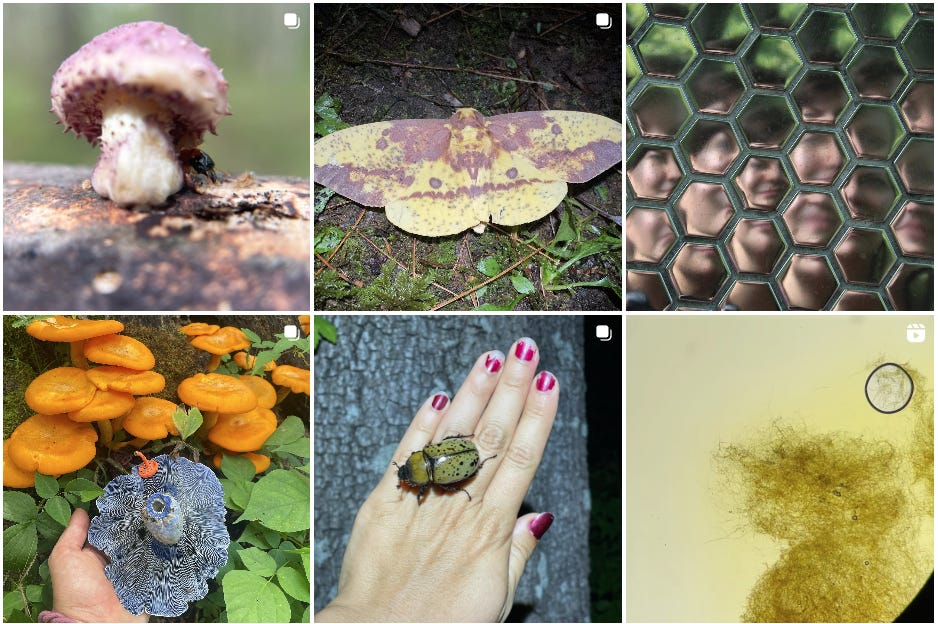Resources for Evaluation Project Management
Welcome to Insights & Opportunities: A Hub for Informal STEM Education! Insights & Opportunities is a twice-monthly newsletter for educators, administrators, legislators, and advocates who recognize the importance of informal STEM learning.
This newsletter is brought to you by me, Sarah Dunifon, and my team at Improved Insights. I’m a long-time STEM educator, researcher, and equity advocate. Along with my team, I now work on cutting-edge informal STEM learning research and evaluation.
Each edition of this newsletter offers exciting insights, resources, and opportunities for informal STEM learning professionals, including funding, jobs, professional development, informal STEM learning research, evaluation tips and resources, and so much more! We hope you find it valuable. Now, let’s get started.
Resources for Evaluation Project Management
In our last feature, we turned things over to Improved Insight’s Evaluation Assistant, Emily Neill, to discuss how a detail-oriented mindset and thoughtful infrastructure are key to program success. In this post, Emily will continue her discussion by highlighting a few tools that she uses to manage evaluation projects.
-
Even the most savvy, organized project manager can’t simultaneously hold everything in their head. Early in my career, I relied heavily on a series of color-coded notebooks to keep track of the ins and outs of everyday tasks. But now that I’m managing my workload and tracking the progress of projects that often have multiple team members assigned to them and high levels of complexity, I’ve upgraded my systems. The following are a few of the tools and processes that I use to help me plot the course of projects from start to finish.
Asana - for detailed project breakdowns, task tracking & reporting
There are a multitude of project management tools on the market. I’ve used a few of them, and there are benefits and drawbacks to all of them. The one that works best for me is Asana.
Pros:
User-Friendly: The workspace is easy to navigate at a glance, and there is not a lot of “fluff” in the margins to distract from key functions.
Customizable Views: Like all project management tools, you can customize views of project boards to a format that works best for you. My favorite is the “list” view, but I often use the Gantt chart function when focusing on developing timelines.
Simplicity: I’m always an advocate for keeping things simple - and Asana’s layout is geared toward exactly that. Asana maintains a balance of customizable features while not overwhelming their system with too many bells and whistles. This forces me to simplify tasks, which ultimately leads to a more manageable project.
Cons:
Nimbleness: Changes within a system once it is set are not the most straightforward. Shifting a subtask to a normal task is not as simple as dragging and dropping between headings. However, there are workarounds (like copying and pasting headings to their appropriate location) that overcome this issue.
Assignees: Asana does not allow multiple assignees to a single task. Again, there are workarounds to this, but it takes a little bit of creativity to navigate. I typically break down a task into subtasks, and assign each person to their appropriate subtask instead of the general heading.
How I use it:
Asana is my main hub for all evaluation projects. This is where I set the structure in place for all processes and tasks and set deadlines to help keep my team on track.
To read the full article, check it out in our Insights.
60-Second Suggestions
Here are a few of my favorite things this month, usually pertaining to informal STEM education and evaluation, but occasionally some fun personal stuff, too.
This opinion piece from the Hechinger Report examines the career trajectories and dropout rates of women in STEM, finding that though rates of engagement of young women in STEM have increased, the rates of mid-career dropout, particularly in academia, are concerning. The article recommends a few changes that workplaces and universities could implement to better support and encourage the retention of women in the field.
In June the REVISE Center launched its first interest group, “Building Equitable Relationships.” REVISE is extending the invite to the informal STEM education and learning community to join the group each month for discussions around special topics. The group will focus on understanding how to establish and maintain equitable community partnerships and relationships and will bring together experts in the field to share best practices.
Dr. Kristen Wickert, otherwise known as KayDubs the Hiking Scientist, is a scientist in Appalachia studying invasive species in partnership with the West Virginia Department of Agriculture. Her Instagram page is filled with amazing animal photos and educational content about flora and fauna native to the Appalachian region.
Opportunities
Check out these new opportunities for the informal STEM learning community.
Funding:
2024 SWPA Moonshot Grants, Remake Learning, up to $70,000. Applicants in the greater Pittsburgh region of southwestern Pennsylvania, eastern Ohio, and northern West Virginia regions are eligible to apply for funding in support of innovative approaches to future learning. Submissions should center equity and justice by supporting learners of color, learners in poverty, learners in rural areas, girls in STEM and/or learners with disabilities. An informational webinar will be held on August 7, 2024, from 1:00-2:30 PM ET. Applications are due September 15, 2024.
Gulf Futures Challenge, Lever for Change, $1 million-$20 million. Nonprofits, local, state, and tribal governments, and academic institutions are invited to apply for funding to support initiatives that apply, translate, or communicate science, engineering, or medical knowledge to produce inclusive, innovative, and transformative solutions to key challenges facing the Gulf region. The Challenge will prioritize projects that address three areas: The Future of Energy Transition; The Future of Environmental Change along the Coast; and The Future of Healthy and Resilient Communities. Interested applicants must register to apply by August 20, 2024.
Impact KC, Greater Kansas City Community Foundation, $5,000-$15,000. Four organizations in the greater Kansas City area will receive funding for programs that demonstrate a substantive impact in a variety of focus areas, including education and youth services. Applications are due August 30, 2024.
Next Gen STEM (NGS) FY 2024 Teams Engaging Affiliated Museums and Informal Institutions (TEAM II) Community Anchor Award & STEM Innovator Award, NASA. The NASA OSTEM TEAM II Program seeks proposals from U.S. nonprofit science museums, planetariums, youth-serving organizations, libraries, and other Informal Education Institutions (IEIs) to provide inquiry- or experiential-based educational opportunities that align with major NASA missions for students and the public. An informational webinar will be held on August 13, 2024, from 12:30-2:00 pm ET. Proposals are due August 27 (TEAM II Community Anchor) and September 26, 2024 (TEAM II STEM Innovator).
Jobs and Fellowships:
Adventure Program Coordinator, Wolf Ridge Environmental Learning Center (Finland, MN), $40,000. The Adventure Programs Coordinator will facilitate year-round programming and manage a diverse array of adventure education programs. They will teach classes, write and maintain curriculum, assist in training of seasonal staff, among other duties. Applications are due August 5, 2024.
Chicago Region Program Director, Field Museum (Chicago, IL), $115,000. The Chicago Region Program Director will lead, develop, and integrate existing programs and implement new, inclusive initiatives. To achieve this, the director will lead a cross-disciplinary team to execute strategic goals and cultivate a collaborative environment. They will cultivate relationships with key actors and funders in the Chicago region.
Nature Connections Program Coordinator, Young Women Empowered (Y-WE) (Seattle, WA), $70,000. The Nature Connections Program Coordinator will plan, coordinate, and facilitate outdoor education programs and environmental justice-focused activities. They will manage program logistics, facilitate and coordinate with organizational partners on educational offerings, and actively support youth in building outdoor skills.
Piscataquis County Education Manager, Appalachian Mountain Club (Greenville, ME), $43,000. The Piscataquis County Education Manager will manage and develop AMC's educational efforts in the county as a component of the AMCR Maine Woods Community and Youth Environment Program. They will work closely with a variety of community partners to provide environmental education, youth-positive development, and outdoor recreation learning experiences to area youth. This includes program design, curriculum and logistics decisions.
Senior Director of Learning and Engagement, San Diego Natural History Museum (San Diego, CA), $95,000. The Senior Director of Learning and Engagement will spearhead the museum's nature education and volunteer programs, providing strategic leadership and creative direction for student, family, and adult program development, volunteer programs, community partnerships, and on-the-floor engagement activities. Applications are due August 15, 2024.
Professional Development:
2024 AISES National Conference, American Indian Science and Engineering Society (AISES), October 3-5, 2024 (San Antonio, TX). The Annual AISES National Conference is a unique, three-day event focusing on educational, professional, and workforce development for Indigenous peoples of North America and the Pacific Islands in science, technology, engineering, and math (STEM) studies and careers. Join AISES in San Antonio, TX October 3-5, 2024.
ASTC Chicago 2024, Association of Science and Technology Centers (ASTC), September 28-October 1, 2024 (Chicago, IL). ASTC will hold its annual conference in Chicago, IL from September 28-October 1, 2024. The conference will host a global community of science-engagement professionals, leaders in science and technology centers, and museums for plenary and professional development sessions. Early bird registration ends on August 12, 2024.
AZA 2024 Annual Conference, Association of Zoos & Aquariums, September 14-19, 2024 (Calgary, Alberta, Canada). The Association of Zoos & Aquariums will host their annual conference in Calgary from September 14-19, 2024. During the conference, zoo and aquarium professionals will explore ideas and best practices through more than 150 education program sessions, participate in round-table topic discussions, experience new technology, and more. Early bird registration closes on August 16, 2024.
Project Brainy, The Institute for the Study of Resilience in Youth (ISRY). The Institute for the Study of Resilience in Youth (ISRY) is seeking out-of-school time leaders to implement Project Brainy, a curriculum for middle school youth (grades 6 through 8) that focuses on social-emotional development, science learning, and literacy skills while supporting youth mental health. Those interested in implementing the curriculum should apply by August 2, 2024. Selected facilitators will receive a $1500 stipend upon project completion.
Thanks for tuning in to this edition of Insights and Opportunities. While you’re waiting for the next edition, tell your friends! We appreciate you sending along a blog post you enjoyed, a job opportunity you think a friend should apply for, and resources you found valuable. Sharing this newsletter is the best way to support this work. Until next time - thanks!







